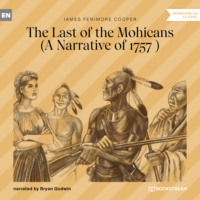
Полная версия
The Deerslayer
It may strike the reader as a little singular, that the place where a stream of any size passed through banks that had an elevation of some twenty feet, should be a matter of doubt with men who could not now have been more than two hundred yards distant from the precise spot. It will be recollected, however, that the trees and bushes here, as elsewhere, fairly overhung the water, making such a fringe to the lake, as to conceal any little variations from its general outline.
"I've not been down at this end of the lake these two summers," said Hurry, standing up in the canoe, the better to look about him. "Ay, there's the rock, showing its chin above the water, and I know that the river begins in its neighborhood."
The men now plied the paddles again, and they were presently within a few yards of the rock, floating towards it, though their efforts were suspended. This rock was not large, being merely some five or six feet high, only half of which elevation rose above the lake. The incessant washing of the water for centuries had so rounded its summit, that it resembled a large beehive in shape, its form being more than usually regular and even. Hurry remarked, as they floated slowly past, that this rock was well known to all the Indians in that part of the country, and that they were in the practice of using it as a mark to designate the place of meeting, when separated by their hunts and marches.
"And here is the river, Deerslayer," he continued, "though so shut in by trees and bushes as to look more like an and-bush, than the outlet of such a sheet as the Glimmerglass."
Hurry had not badly described the place, which did truly seem to be a stream lying in ambush. The high banks might have been a hundred feet asunder; but, on the western side, a small bit of low land extended so far forward as to diminish the breadth of the stream to half that width.
As the bushes hung in the water beneath, and pines that had the stature of church-steeples rose in tall columns above, all inclining towards the light, until their branches intermingled, the eye, at a little distance, could not easily detect any opening in the shore, to mark the egress of the water. In the forest above, no traces of this outlet were to be seen from the lake, the whole presenting the same connected and seemingly interminable carpet of leaves. As the canoe slowly advanced, sucked in by the current, it entered beneath an arch of trees, through which the light from the heavens struggled by casual openings, faintly relieving the gloom beneath.
"This is a nat'ral and-bush," half whispered Hurry, as if he felt that the place was devoted to secrecy and watchfulness; "depend on it, old Tom has burrowed with the ark somewhere in this quarter. We will drop down with the current a short distance, and ferret him out."
"This seems no place for a vessel of any size," returned the other; "it appears to me that we shall have hardly room enough for the canoe."
Hurry laughed at the suggestion, and, as it soon appeared, with reason; for the fringe of bushes immediately on the shore of the lake was no sooner passed, than the adventurers found themselves in a narrow stream, of a sufficient depth of limpid water, with a strong current, and a canopy of leaves upheld by arches composed of the limbs of hoary trees. Bushes lined the shores, as usual, but they left sufficient space between them to admit the passage of anything that did not exceed twenty feet in width, and to allow of a perspective ahead of eight or ten times that distance.
Neither of our two adventurers used his paddle, except to keep the light bark in the centre of the current, but both watched each turning of the stream, of which there were two or three within the first hundred yards, with jealous vigilance. Turn after turn, however, was passed, and the canoe had dropped down with the current some little distance, when Hurry caught a bush, and arrested its movement so suddenly and silently as to denote some unusual motive for the act. Deerslayer laid his hand on the stock of his rifle as soon as he noted this proceeding, but it was quite as much with a hunter's habit as from any feeling of alarm.
"There the old fellow is!" whispered Hurry, pointing with a finger, and laughing heartily, though he carefully avoided making a noise, "ratting it away, just as I supposed; up to his knees in the mud and water, looking to the traps and the bait. But for the life of me I can see nothing of the ark; though I'll bet every skin I take this season, Jude isn't trusting her pretty little feet in the neighborhood of that black mud. The gal's more likely to be braiding her hair by the side of some spring, where she can see her own good looks, and collect scornful feelings ag'in us men."
"You over-judge young women—yes, you do, Hurry—who as often bethink them of their failings as they do of their perfections. I dare to say this Judith, now, is no such admirer of herself, and no such scorner of our sex as you seem to think; and that she is quite as likely to be sarving her father in the house, wherever that may be, as he is to be sarving her among the traps."
"It's a pleasure to hear truth from a man's tongue, if it be only once in a girl's life," cried a pleasant, rich, and yet soft female voice, so near the canoe as to make both the listeners start. "As for you, Master Hurry, fair words are so apt to choke you, that I no longer expect to hear them from your mouth; the last you uttered sticking in your throat, and coming near to death. But I'm glad to see you keep better society than formerly, and that they who know how to esteem and treat women are not ashamed to journey in your company."
As this was said, a singularly handsome and youthful female face was thrust through an opening in the leaves, within reach of Deerslayer's paddle. Its owner smiled graciously on the young man; and the frown that she cast on Hurry, though simulated and pettish, had the effect to render her beauty more striking, by exhibiting the play of an expressive but capricious countenance; one that seemed to change from the soft to the severe, the mirthful to the reproving, with facility and indifference.
A second look explained the nature of the surprise. Unwittingly, the men had dropped alongside of the ark, which had been purposely concealed in bushes cut and arranged for the purpose; and Judith Hutter had merely pushed aside the leaves that lay before a window, in order to show her face, and speak to them.
Chapter IV.
The ark, as the floating habitation of the Hutters was generally called, was a very simple contrivance. A large flat, or scow, composed the buoyant part of the vessel; and in its centre, occupying the whole of its breadth, and about two thirds of its length, stood a low fabric, resembling the castle in construction, though made of materials so light as barely to be bullet-proof. As the sides of the scow were a little higher than usual, and the interior of the cabin had no more elevation than was necessary for comfort, this unusual addition had neither a very clumsy nor a very obtrusive appearance. It was, in short, little more than a modern canal-boat, though more rudely constructed, of greater breadth than common, and bearing about it the signs of the wilderness, in its bark-covered posts and roof. The scow, however, had been put together with some skill, being comparatively light, for its strength, and sufficiently manageable. The cabin was divided into two apartments, one of which served for a parlor, and the sleeping-room of the father, and the other was appropriated to the uses of the daughters. A very simple arrangement sufficed for the kitchen, which was in one end of the scow, and removed from the cabin, standing in the open air; the ark being altogether a summer habitation.
The "and-bush," as Hurry in his ignorance of English termed it, is quite as easily explained. In many parts of the lake and river, where the banks were steep and high, the smaller trees and larger bushes, as has been already mentioned, fairly overhung the stream, their branches not unfrequently dipping into the water. In some instances they grew out in nearly horizontal lines, for thirty or forty feet. The water being uniformly deepest near the shores, where the banks were highest and the nearest to a perpendicular, Hutter had found no difficulty in letting the ark drop under one of these covers, where it had been anchored with a view to conceal its position; security requiring some such precautions, in his view of the case. Once beneath the trees and bushes, a few stones fastened to the ends of the branches had caused them to bend sufficiently to dip into the river; and a few severed bushes, properly disposed, did the rest. The reader has seen that this cover was so complete as to deceive two men accustomed to the woods, and who were actually in search of those it concealed; a circumstance that will be easily understood by those who are familiar with the matted and wild luxuriance of a virgin American forest, more especially in a rich soil. The discovery of the ark produced very different effects on our two adventurers.
As soon as the canoe could be got round to the proper opening, Hurry leaped on board, and in a minute was closely engaged in a gay, and a sort of recriminating discourse with Judith, apparently forgetful of the existence of all the rest of the world. Not so with Deerslayer. He entered the ark with a slow, cautious step, examining every arrangement of the cover with curious and scrutinizing eyes. It is true, he cast one admiring glance at Judith, which was extorted by her brilliant and singular beauty; but even this could detain him but a single instant from the indulgence of his interest in Hutter's contrivances. Step by step did he look into the construction of the singular abode, investigate its fastenings and strength, ascertain its means of defence, and make every inquiry that would be likely to occur to one whose thoughts dwelt principally on such expedients. Nor was the cover neglected. Of this he examined the whole minutely, his commendation escaping him more than once in audible comments. Frontier usages admitting of this familiarity, he passed through the rooms, as he had previously done at the 'Castle', and opening a door issued into the end of the scow opposite to that where he had left Hurry and Judith. Here he found the other sister, employed at some coarse needle-work, seated beneath the leafy canopy of the cover.
As Deerslayer's examination was by this time ended, he dropped the butt of his rifle, and, leaning on the barrel with both hands, he turned towards the girl with an interest the singular beauty of her sister had not awakened. He had gathered from Hurry's remarks that Hetty was considered to have less intellect than ordinarily falls to the share of human beings, and his education among Indians had taught him to treat those who were thus afflicted by Providence with more than common tenderness. Nor was there any thing in Hetty Hutter's appearance, as so often happens, to weaken the interest her situation excited. An idiot she could not properly be termed, her mind being just enough enfeebled to lose most of those traits that are connected with the more artful qualities, and to retain its ingenuousness and love of truth. It had often been remarked of this girl, by the few who had seen her, and who possessed sufficient knowledge to discriminate, that her perception of the right seemed almost intuitive, while her aversion to the wrong formed so distinctive a feature of her mind, as to surround her with an atmosphere of pure morality; peculiarities that are not infrequent with persons who are termed feeble-minded; as if God had forbidden the evil spirits to invade a precinct so defenceless, with the benign purpose of extending a direct protection to those who had been left without the usual aids of humanity. Her person, too, was agreeable, having a strong resemblance to that of her sister's, of which it was a subdued and humble copy. If it had none of the brilliancy of Judith's, the calm, quiet, almost holy expression of her meek countenance seldom failed to win on the observer, and few noted it long that did not begin to feel a deep and lasting interest in the girl. She had no colour, in common, nor was her simple mind apt to present images that caused her cheek to brighten, though she retained a modesty so innate that it almost raised her to the unsuspecting purity of a being superior to human infirmities. Guileless, innocent, and without distrust, equally by nature and from her mode of life, providence had, nevertheless shielded her from harm, by a halo of moral light, as it is said 'to temper the wind to the shorn lamb.'
"You are Hetty Hutter," said Deerslayer, in the way one puts a question unconsciously to himself, assuming a kindness of tone and manner that were singularly adapted to win the confidence of her he addressed. "Hurry Harry has told me of you, and I know you must be the child?"
"Yes, I'm Hetty Hutter" returned the girl in a low, sweet voice, which nature, aided by some education, had preserved from vulgarity of tone and utterance-"I'm Hetty; Judith Hutter's sister; and Thomas Hutter's youngest daughter."
"I know your history, then, for Hurry Harry talks considerable, and he is free of speech when he can find other people's consarns to dwell on. You pass most of your life on the lake, Hetty."
"Certainly. Mother is dead; father is gone a-trapping, and Judith and I stay at home. What's your name?"
"That's a question more easily asked than it is answered, young woman, seeing that I'm so young, and yet have borne more names than some of the greatest chiefs in all America."
"But you've got a name—you don't throw away one name, before you come honestly by another?"
"I hope not, gal—I hope not. My names have come nat'rally, and I suppose the one I bear now will be of no great lasting, since the Delawares seldom settle on a man's ra'al title, until such time as he has an opportunity of showing his true natur', in the council, or on the warpath; which has never behappened me; seeing firstly, because I'm not born a red-skin and have no right to sit in their councillings, and am much too humble to be called on for opinions from the great of my own colour; and, secondly, because this is the first war that has befallen in my time, and no inimy has yet inroaded far enough into the colony, to be reached by an arm even longer than mine."
"Tell me your names," added Hetty, looking up at him artlessly, "and, maybe, I'll tell you your character."
"There is some truth in that, I'll not deny, though it often fails. Men are deceived in other men's characters, and frequently give 'em names they by no means desarve. You can see the truth of this in the Mingo names, which, in their own tongue, signify the same things as the Delaware names,—at least, so they tell me, for I know little of that tribe, unless it be by report,—and no one can say they are as honest or as upright a nation. I put no great dependence, therefore, on names."
"Tell me all your names," repeated the girl, earnestly, for her mind was too simple to separate things from professions, and she did attach importance to a name; "I want to know what to think of you."
"Well, sartain; I've no objection, and you shall hear them all. In the first place, then, I'm Christian, and white-born, like yourself, and my parents had a name that came down from father to son, as is a part of their gifts. My father was called Bumppo; and I was named after him, of course, the given name being Nathaniel, or Natty, as most people saw fit to tarm it."
"Yes, yes—Natty—and Hetty" interrupted the girl quickly, and looking up from her work again, with a smile: "you are Natty, and I'm Hetty-though you are Bumppo, and I'm Hutter. Bumppo isn't as pretty as Hutter, is it?"
"Why, that's as people fancy. Bumppo has no lofty sound, I admit; and yet men have bumped through the world with it. I did not go by this name, howsoever, very long; for the Delawares soon found out, or thought they found out, that I was not given to lying, and they called me, firstly, 'Straight-tongue.'"
"That's a good name," interrupted Hetty, earnestly, and in a positive manner; "don't tell me there's no virtue in names!"
"I do not say that, for perhaps I desarved to be so called, lies being no favorites with me, as they are with some. After a while they found out I was quick of foot, and then they called me 'The Pigeon'; which, you know, has a swift wing, and flies in a straight line."
"That was a pretty name!" exclaimed Hetty; "pigeons are pretty birds!"
"Most things that God created are pretty in their way, my good gal, though they get to be deformed by mankind, so as to change their natur's, as well as their appearance. From carrying messages, and striking blind trails, I got at last to following the hunters, when it was thought I was quicker and surer at finding the game than most lads, and then they called me the 'Lap-ear'; as, they said, I partook of the sagacity of the hound."
"That's not so pretty," answered Hetty; "I hope you didn't keep that name long."
"Not after I was rich enough to buy a rifle," returned the other, betraying a little pride through his usually quiet and subdued manner; "then it was seen I could keep a wigwam in ven'son; and in time I got the name of 'Deerslayer,' which is that I now bear; homely as some will think it, who set more value on the scalp of a fellow-mortal than on the horns of a buck."
"Well, Deerslayer, I'm not one of them," answered Hetty, simply; "Judith likes soldiers, and flary coats, and fine feathers; but they're all naught to me. She says the officers are great, and gay, and of soft speech; but they make me shudder, for their business is to kill their fellow-creatures. I like your calling better; and your last name is a very good one—better than Natty Bumppo."
"This is nat'ral in one of your turn of mind, Hetty, and much as I should have expected. They tell me your sister is handsome—oncommon, for a mortal; and beauty is apt to seek admiration."
"Did you never see Judith?" demanded the girl, with quick earnestness; "if you never have, go at once and look at her. Even Hurry Harry isn't more pleasant to look at though she is a woman, and he is a man."
Deerslayer regarded the girl for a moment with concern. Her pale-face had flushed a little, and her eye, usually so mild and serene, brightened as she spoke, in the way to betray the inward impulses.
"Ay, Hurry Harry," he muttered to himself, as he walked through the cabin towards the other end of the boat; "this comes of good looks, if a light tongue has had no consarn in it. It's easy to see which way that poor creatur's feelin's are leanin', whatever may be the case with your Jude's."
But an interruption was put to the gallantry of Hurry, the coquetry of his intros, the thoughts of Deerslayer, and the gentle feelings of Hetty, by the sudden appearance of the canoe of the ark's owner, in the narrow opening among the bushes that served as a sort of moat to his position. It would seem that Hutter, or Floating Tom, as he was familiarly called by all the hunters who knew his habits, recognized the canoe of Hurry, for he expressed no surprise at finding him in the scow. On the contrary, his reception was such as to denote not only gratification, but a pleasure, mingled with a little disappointment at his not having made his appearance some days sooner.
"I looked for you last week," he said, in a half-grumbling, half-welcoming manner; "and was disappointed uncommonly that you didn't arrive. There came a runner through, to warn all the trappers and hunters that the colony and the Canadas were again in trouble; and I felt lonesome, up in these mountains, with three scalps to see to, and only one pair of hands to protect them."
"That's reasonable," returned March; "and 't was feeling like a parent. No doubt, if I had two such darters as Judith and Hetty, my exper'ence would tell the same story, though in gin'ral I am just as well satisfied with having the nearest neighbor fifty miles off, as when he is within call."
"Notwithstanding, you didn't choose to come into the wilderness alone, now you knew that the Canada savages are likely to be stirring," returned Hutter, giving a sort of distrustful, and at the same time inquiring glance at Deerslayer.
"Why should I? They say a bad companion, on a journey, helps to shorten the path; and this young man I account to be a reasonably good one. This is Deerslayer, old Tom, a noted hunter among the Delawares, and Christian-born, and Christian-edicated, too, like you and me. The lad is not parfect, perhaps, but there's worse men in the country that he came from, and it's likely he'll find some that's no better, in this part of the world. Should we have occasion to defend our traps, and the territory, he'll be useful in feeding us all; for he's a reg'lar dealer in ven'son."
"Young man, you are welcome," growled Tom, thrusting a hard, bony hand towards the youth, as a pledge of his sincerity; "in such times, a white face is a friend's, and I count on you as a support. Children sometimes make a stout heart feeble, and these two daughters of mine give me more concern than all my traps, and skins, and rights in the country."
"That's nat'ral!" cried Hurry. "Yes, Deerslayer, you and I don't know it yet by experience; but, on the whole, I consider that as nat'ral. If we had darters, it's more than probable we should have some such feelin's; and I honor the man that owns 'em. As for Judith, old man, I enlist, at once, as her soldier, and here is Deerslayer to help you to take care of Hetty."
"Many thanks to you, Master March," returned the beauty, in a full, rich voice, and with an accuracy of intonation and utterance that she shared in common with her sister, and which showed that she had been better taught than her father's life and appearance would give reason to expect. "Many thanks to you; but Judith Hutter has the spirit and the experience that will make her depend more on herself than on good-looking rovers like you. Should there be need to face the savages, do you land with my father, instead of burrowing in the huts, under the show of defending us females and-"
"Girl—girl," interrupted the father, "quiet that glib tongue of thine, and hear the truth. There are savages on the lake shore already, and no man can say how near to us they may be at this very moment, or when we may hear more from them!"
"If this be true, Master Hutter," said Hurry, whose change of countenance denoted how serious he deemed the information, though it did not denote any unmanly alarm, "if this be true, your ark is in a most misfortunate position, for, though the cover did deceive Deerslayer and myself, it would hardly be overlooked by a full-blooded Injin, who was out seriously in s'arch of scalps!"
"I think as you do, Hurry, and wish, with all my heart, we lay anywhere else, at this moment, than in this narrow, crooked stream, which has many advantages to hide in, but which is almost fatal to them that are discovered. The savages are near us, moreover, and the difficulty is, to get out of the river without being shot down like deer standing at a lick!"
"Are you sartain, Master Hutter, that the red-skins you dread are ra'al Canadas?" asked Deerslayer, in a modest but earnest manner. "Have you seen any, and can you describe their paint?"
"I have fallen in with the signs of their being in the neighborhood, but have seen none of 'em. I was down stream a mile or so, looking to my traps, when I struck a fresh trail, crossing the corner of a swamp, and moving northward. The man had not passed an hour; and I know'd it for an Indian footstep, by the size of the foot, and the intoe, even before I found a worn moccasin, which its owner had dropped as useless. For that matter, I found the spot where he halted to make a new one, which was only a few yards from the place where he had dropped the old one."
"That doesn't look much like a red-skin on the war path!" returned the other, shaking his head. "An exper'enced warrior, at least, would have burned, or buried, or sunk in the river such signs of his passage; and your trail is, quite likely, a peaceable trail. But the moccasin may greatly relieve my mind, if you bethought you of bringing it off. I've come here to meet a young chief myself; and his course would be much in the direction you've mentioned. The trail may have been his'n."






